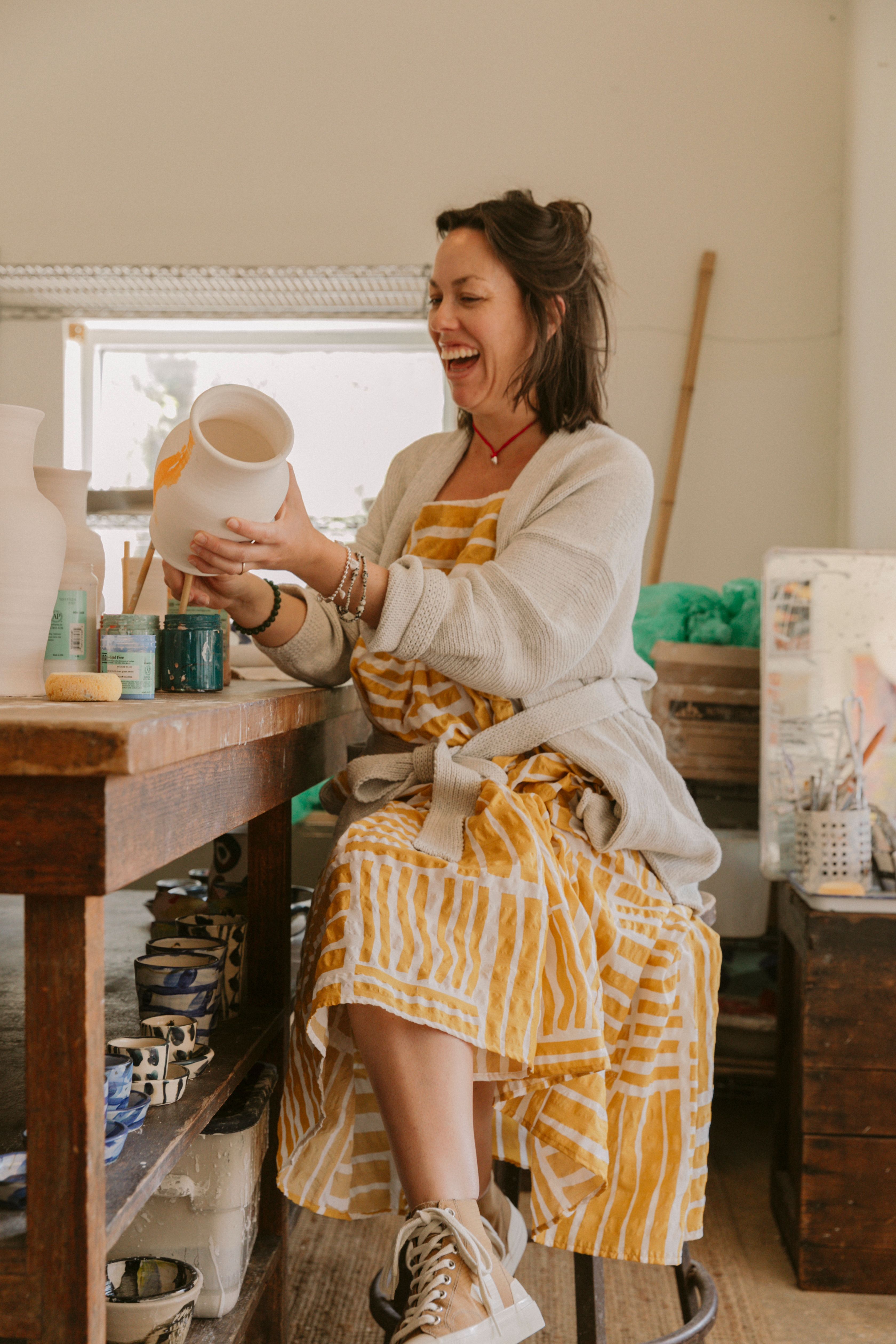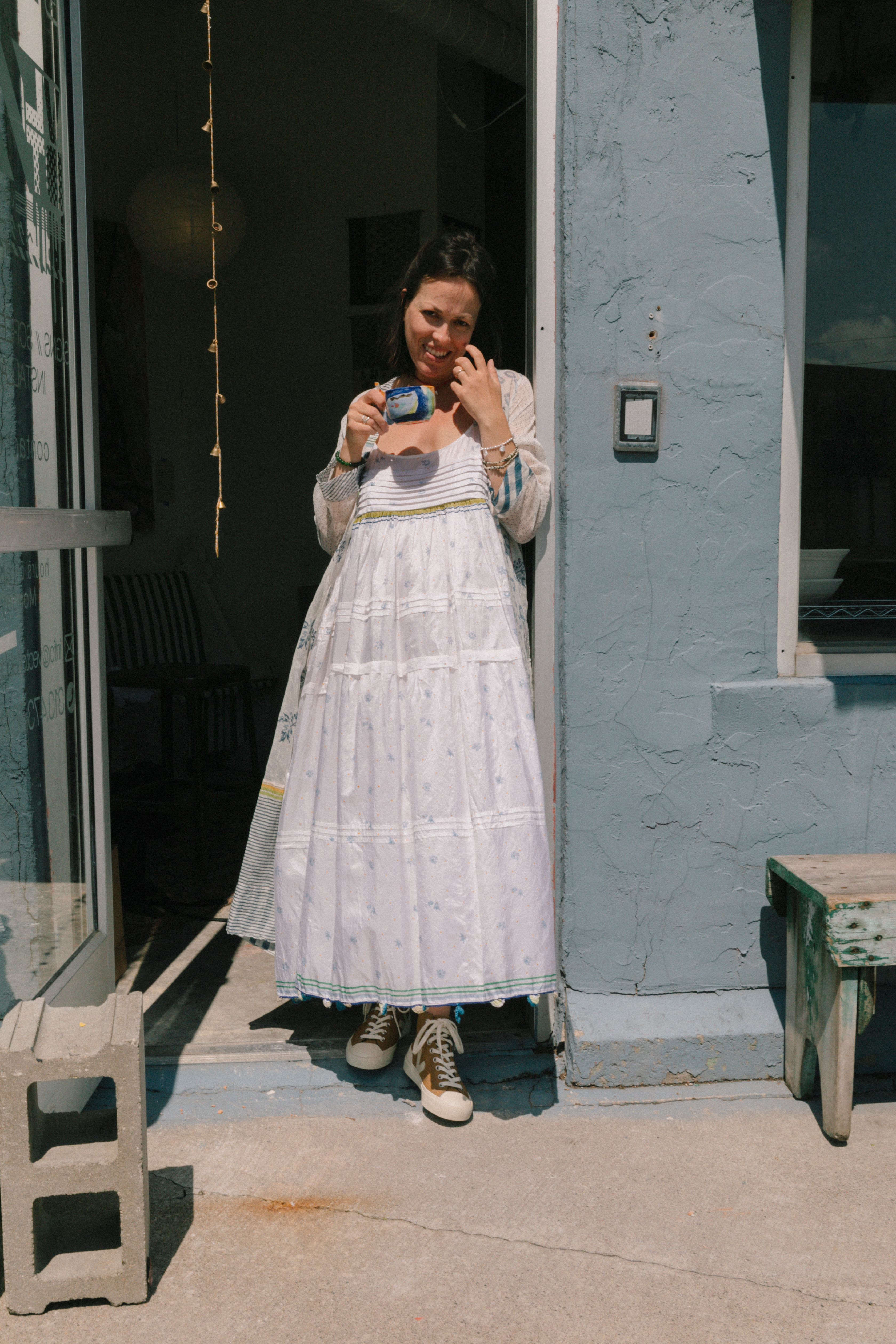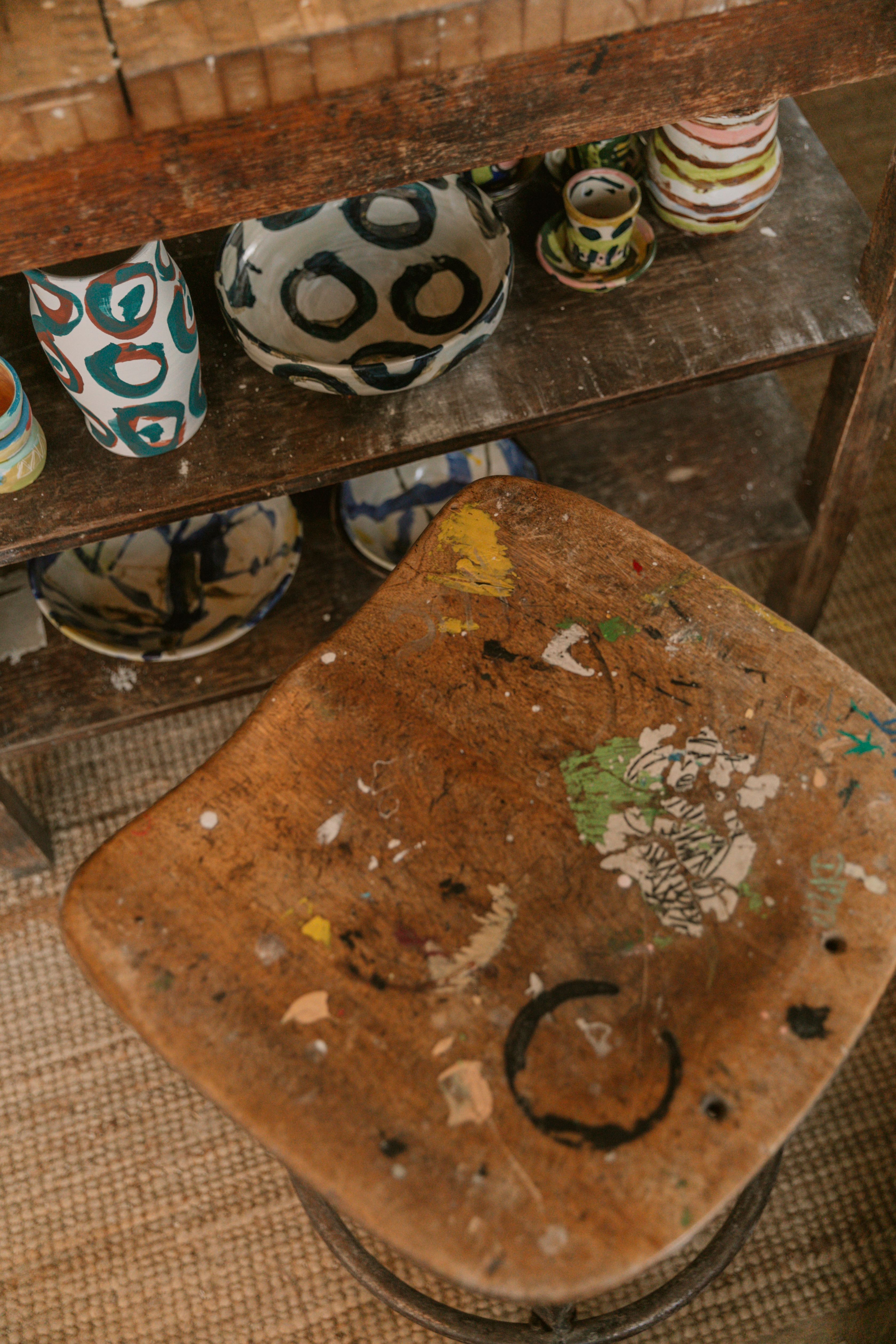Jessie Hicks: On Making and Mothering
As both a mother and a maker, local artist Jessie Hicks explores transformation through her creative practice. Navigating the tension between intention and reception, she brings a nuanced sensibility to the everyday. Working across a range of mediums—including clay, paint, and food—Jessie’s art emerges from a deeply rooted sense of self. Whether kneading dough or clay, she follows the rhythms that come most naturally to her.
The former owner and culinary force behind Detroit-based award-winning cafés Astro and Ochre, Jessie has since shifted her focus to her solo studio practice, Vernor Pots. Operating out of a converted gas station in Southwest Detroit, her studio now serves as a new kind of community hub—this time centered around ceramics. Living and creating in a city known for its resilience and reinvention, Jessie’s work is inseparable from place, grounded in the tactile, the relational, and the cyclical. Across all her forms—ceramics, painting, baking, mothering—she moves with an embodied awareness of time, transformation, and the personal imprint of the hand.
Read our exclusive interview with Jessie Hicks below, and shop her style here.
eugenie: You've made a home and a creative life here in Detroit—a city known for its resilience, reinvention, and deep sense of community. How has this place shaped the way you think about making and mothering?
Jessie Hicks: More than anything, I don’t think I truly understood the value and meaning of community until I moved to Detroit. I’ve lived here for 17 years now and I feel really lucky to have the perspective that time in the city has given me. The people here are everything.
There is also a great understanding of not taking anything for granted, every tree, every flower, especially at this time of the year after the long winter! It makes you notice the beauty in ways that can easily be overlooked in other places. This noticing of the little things is what I really take with me in my daily life as a mother and also a maker. Preparing dinner with my daughter or going to the park in the evening. It’s not just making a cup or a vase, it’s a little piece of someone’s daily life and if it can cheer them up for a moment, that’s success. It’s a sort of confidence in knowing that the small moments make a difference, and there’s a kind of peace in that.

eugenie: Your work is deeply connected to the body through shaping clay, preparing food, and creating objects that serve daily life. What does it mean to create with the body and for the body?
Jessie: I suppose I don’t know any other way of being. Working in a kitchen is very physical in a similar way to working with clay. There are so many ways in which cooking and ceramics are similar.
When I was making sourdough at Ochre I used to always say that it was my lesson in Zen. Dough, especially sourdough, has a life of its own and you have to really learn its ways. Sometimes it doesn’t do what you want it to, a condition in the atmosphere will change or the temperature or timing might be a little off, and you have to accept that it’s not perfect- and occasionally just complete rubbish- and get up the next day and start again. Clay is similar in many ways, you really have to listen to it.
eugenie: You transitioned from crafting nourishment through food to crafting vessels that hold nourishment. What was that shift like, and what has it taught you?
Jessie: In many ways, the transition was a natural one. The actual process of making is not so different in cooking and ceramics; I repurposed many of my old cooking utensils for use in my studio.
Ultimately, though, I shifted from food to clay because I needed to prioritize my family. I wasn’t simply "cooking" before—I was running several businesses. I was burnt out, overwhelmed, and unable to properly care for myself or my family. Building a new life as an artist hasn’t been without its challenges—it’s been a steep learning curve, and I still often feel like I’m fumbling my way through it—but the pace is more sustainable for me now.
eugenie: As a mother of two, you're constantly holding both creativity and practicality. How do you navigate or negotiate those dual roles? Are there structures or rhythms you rely on to support both?
Jessie: I admit this is a daily—well, I don’t want to say “struggle,” but rather a practice—that sometimes gets the better of me. I’m not naturally structured or organized, so I have to be very intentional about my rhythms to get anything done. Even then, I often feel like I’m constantly running behind. I go to my studio every day after dropping my kids off at school and leave when it’s time to pick them up. I’m constantly negotiating between the two hemispheres of my life.
What initially drew me to ceramics was its practicality—the intersection of art and daily life, usefulness and beauty. The process demands complete presence; you're forced to be in the moment. Its physical nature helps keep me grounded and stops me from getting too lost in my head.
eugenie: Your creative life spans many forms—baking, cooking, ceramics, painting. What is the common thread or central node that ties all of these expressions together?
Jessie: Although I think my approach to food, ceramics, and painting are all philosophically quite different—I prefer a "less is more" approach to food, while I am almost the opposite in my ceramics—for me, any expression is about the vitality of the moment, the life force of something. It’s about not overworking anything or trying to be perfect, but letting it retain its initial essence.
I love working with food, especially seasonally, because there is such an essentialness to it. It is impermanent, and the goal is to retain its buoyancy rather than shape it into something it isn’t. Painting feels similar to me—it’s a kind of response to what is being presented.
eugenie: In both mothering and making, there’s an element of surrender—to process, to time, to mess. How do you experience or resist that surrender?
Jessie: I have to re-learn to surrender every day! Every day is a constant letting go of expectations and ideals; it’s very humbling! Letting go of perfection is maybe the most liberating thing—accepting that “good enough” is often just right. I feel like every day I have to re-learn to accept that my house is a mess or in some kind of chaos at all times, and that’s just what it is to live with children. It’s kind of nice, actually.
Accepting that I never have the time to do everything is more difficult. I’m sure every parent struggles with all of these things, but there’s just never enough time! I’m often overly optimistic about what I can accomplish, and that can cause me problems at times.
eugenie: Your time in Detroit has included many evolutions, yet your signature remains—the personal imprint of your hand visible in each iteration. How do you relate to change, both in your creative work and your sense of self?
Jessie: I need a certain amount of change to feel alive. Stagnation feels like the opposite of living to me, so I am always creatively charged by change, even if it comes with a certain amount of chaos. In my food businesses, we changed our menu constantly, which certainly was not an easy way to work, but the vitality that you get when something is constantly in motion is what gives it life. Personally, I think it’s almost a relief to stand back and notice myself change, understanding that every experience—even, or especially, the “bad” ones—is an opportunity to evolve.
eugenie: When your art meets the world, transformation happens. How do motherhood and art-making stretch and transform you in return—not just outwardly, but inwardly? What do they reveal, challenge, or expand within you?
Jessie: Motherhood and art-making occupy very different parts of myself. I find being a mother much more challenging. It’s something that I feel we, as women, expect ourselves to just be naturally good at, and so perhaps I give myself a hard time for not always feeling especially maternal. Kids really do come into this life with their own agenda and personality, and I find myself having to remind myself to be conscious about how I show up as a mum. I ask myself, What do I need to learn to work with this person? That’s on a good day—sometimes I just end up screaming at them!
Making art, on the other hand, feels more like my natural habitat. Ceramics especially gets me out of my head; it is a mix of hand skills and intuition. I can learn and improve my skills and get better at understanding my intuition without drowning in some kind of existential drama—which can happen when I paint.
eugenie: You are perhaps most widely known for your amazing work with Astro and Ochre, two former award-winning culinary projects. Recently, a building awareness and excitement has grown around your ceramic project, Vernor Pots. But you also paint—a part of your practice that some people may not know about. How did your relationship with painting emerge from the rich ferment of your creative life?
Jessie: Painting was my first love, actually. Before food or ceramics, there was painting. I had an incredible art mentor when I was a kid, and she really shaped the way I see the world. I had confidence as a painter, which got me through my awkward adolescence. I think about this with my own kids—how important it is to have confidence in doing something. It can really be the difference between standing in your own power or falling to peer pressure.
eugenie: Nature and the earth seem to play a significant role in your work, whether it's through the materials you use or the rhythms you follow. How does your connection to the natural world influence your practice?
Jessie: I’m from a relatively remote part of the world—northern NSW, Australia. It’s very rural, so I almost took for granted how naturally beautiful it was. When I left home and moved to various cities, it was always the birds or the smell of the trees that I missed the most.
I moved to Detroit in the summer of 2008, and while admittedly it wasn’t as easy a transition for me, it was here that I really began to develop a relationship with nature. Michigan summers are truly magical, and learning to live with the seasons in this dramatic climate, especially through food, is one of the best ways to really feel our place in the world.
eugenie: We’re thrilled to carry your ceramics at eugenie for Mother’s Day. Are there other makers or pieces at our shop that resonate with you?
Jessie: I’m so happy to be at eugenie for Mother’s Day! There are so many incredible makers and designers here. I am absolutely in awe of everything from Injiri—the fabrics and all the details are so delicious! I also love Cordera; their mix of minimal lines and subtle feminine detailing feels really exciting somehow.


